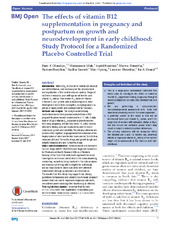The effects of vitamin B12 supplementation in pregnancy and postpartum on growth and neurodevelopment in early childhood: Study Protocol for a Randomized Placebo Controlled Trial
Chandyo, Ram Krishna; Ulak, Manjeswori; Kvestad, Ingrid; Shrestha, Merina; Ranjitkar, Suman; Basnet, Sudha; Hysing, Mari; Shrestha, Laxman; Strand, Tor A
Peer reviewed, Journal article
Published version

Åpne
Permanent lenke
https://hdl.handle.net/1956/17999Utgivelsesdato
2017Metadata
Vis full innførselSamlinger
Originalversjon
https://doi.org/10.1136/bmjopen-2017-016434Sammendrag
Introduction: Vitamin B12 is crucial for normal cell division and differentiation, and necessary for the development and myelination of the central nervous system. Pregnant mothers in resource poor settings are at risk for poor vitamin B12 status. Poor vitamin B12 status in infancy is linked to poor growth and neurodevelopment. Brain development starts from conception, and pregnancy is a period of rapid growth and development for the brain. Methods and analysis: The study is an individually randomised double-blind placebo controlled trial in 800 pregnant Nepalese women randomised in a 1:1 ratio. A daily dose of 50 µg of vitamin B12 or placebo is given to women from early pregnancy, not later than week 15, until 6 months after birth. Weekly visits are conducted in order to record compliance, growth and morbidity. The primary outcomes are scores on the cognitive, language and motor subscales of the Bayley Scales of Infant and Toddler Development, Third Edition, measured at 6 and 12 months of age, and growth (length and weight) measured at 6 and 12 months of age. Ethics and dissemination: National Health and Research Council, Nepal (NHRC 253/2016) and Regional Committee for Medical and Health Research Ethics of Western Norway (2016/1620/REK vest) have approved the study. Investigators who have contributed to the conceptualising, conducting, as well as being involved in the data analyses and manuscript writing will be eligible for authorship and be responsible to share outcomes with different stakeholders through publications and workshops. The results from this study may support new dietary guidelines for Nepalese and possibly South Asian pregnant women that can lead to improved pregnancy outcomes, neurodevelopment and cognitive functioning in children.
